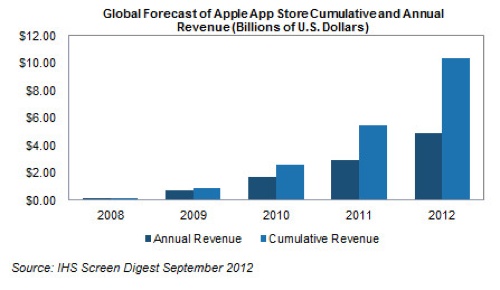With the addition of the new Maps platform and Passbook app to its iOS 6 operating system, Apple has extended the reach of its smartphone and tablet ecosystem into the real world, helping to drive the company’s app store revenue up by nearly 70% this year.
Global Apple App Store revenue is set to increase to US$4.9 billion in 2012, up from $2.9 billion in 2011, according to an “IHS Screen Digest Mobile Analyst Commentary” from information and analytics provider IHS (www.isuppli.com). This means that nearly half of the revenue generated by the App Store in its five-year history will be earned this year alone.
With this strong growth, Apple this year will command about a 65 percent share of the global application store market. The graphic presents annual and cumulative revenue for the Apps Store.
“Until now, Apple’s iOS ecosystem has focused on virtual services, such as apps, digital music and movies,” says Ian Fogg, senior principal analyst for mobile at IHS. “However, with iOS version 6, Apple is moving into real-world location and financial-transaction features. The new Apple Maps and Passbook apps and accompanying location platform for app developers is the keystone for this real-world expansion, and will help support the accelerated growth of the Apple App Store market in 2012.”
Initially Apple’s Maps may lag Android’s Google Maps and Nokia’s Windows Phone location services in some aspects. However, Apple’s new Maps app has many enticing features, Fogg says.
For example, Maps is now much more compelling for drivers because of its turn-by-turn navigation, he adds. This will be more significant in the United States than in Europe, given that U.S. citizens drive twice as much as Europeans. U.S. motorists drove more than 10 times as many miles per capita than in the United Kingdom, for instance.
The new features in iOS6 will be immediately relevant to existing iPhone owners as well as developers because of Apple’s slick upgrade process for new iOS versions. Unlike Android and Windows Phone, most iOS users update to the latest version. At this year’s Apple Worldwide Developers Conference in June, Apple reported that more than 80% of iOS users had upgraded to the then-current iOS 5.
“We expect adoption of iOS6 to be equally swift and pervasive,” says Fogg. “This means that Apple’s app developers have a much greater potential target market for Apps that use iOS6’s headline new features, such as the new Apple Maps location platform, Passbook and Facebook integration. Apple understands that to build a viable ecosystem, it needs to have a large audience of users on the most recent version of iOS. Apple has been, and will continue to be, successful at delivering that up-to-date installed base.”
Such a strategy continues to differentiate Apple from Android smartphones despite the greater number of Android devices shipping. Google’s best intentions notwithstanding, the company has been unable to match Apple’s phone-update process because of its wide variety of Android handset makers and carriers.
Apple is now much more than a hardware company, as demonstrated by the size of Apple’s universe of users for its online cloud-based services, says Fogg. Apple now has more than 435 million iTunes accounts with credit cards attached, dramatically up from 225 million in June 2011.
The impressive growth has been driven by both record-breaking iPhone shipments and by the iOS 5 feature set. Last year’s iOS version encouraged users to sign up for Apple’s ID to enable iOS app downloads, iCloud backup and Game Center support. These accounts use the same Apple ID that ties together Apple’s other online services including the iTunes music store — which made operating Apple devices a seamless experience and made it attractive to legions of users, says Fogg.
Last year’s iOS also focused on digital content and virtual digital services such as iCloud. Once again, the offering was extremely successful: Apple garnered more than 125 million iCloud users, in excess of 130 million Game Center users and over 140 million iMessage users, according to figures reported at the Apple Worldwide Developers Conference.
“Apple is preparing to become not just a computer company or just a mobile hardware provider, but it seeks to be a key company in all parts of consumers’ lives– from entertainment, communication and business that is now expanding into real-world transactions for travel, entertainment events, daily deals and even retail,” Fogg says. “iOS 6 heralds just the start of this journey. And while Apple’s Maps solution may lag that of rivals initially, Apple still has all of the capabilities to win.”

